Analysis of Digital Transformation and Fintech Sector Challenges
VerifiedAdded on 2022/12/29
|9
|2410
|39
Report
AI Summary
This report provides a comprehensive analysis of critical issues in business management, focusing on digital transformation and its impact on the fintech sector, particularly within the Commonwealth. The report explores the opportunities and challenges presented by digital technologies, including productivity gains, diversification in production, and enhanced market access. It also evaluates the impact of COVID-19 on the fintech sector, examining the challenges faced by fintech companies, such as funding constraints, and the shift towards digital interactions and remote working. The analysis includes an overview of the Commonwealth's trade trends and the role of e-commerce in diversification. The report concludes by highlighting the importance of digital transformation for business success and adaptability in the face of global challenges. The report also examines the impact of COVID-19 on the fintech sector, including the challenges faced by fintech companies, such as funding constraints, and the shift towards digital interactions and remote working.

Critical Issues in
Business Management
Business Management
Paraphrase This Document
Need a fresh take? Get an instant paraphrase of this document with our AI Paraphraser

Table of Contents
INTRODUCTION...........................................................................................................................3
MAIN BODY...................................................................................................................................3
Opportunities and challenges in Digital Transformation in the Commonwealth.......................3
Evaluate the impact of COVID-19 on the trade and investment on the fintech sector...............6
CONCLUSION................................................................................................................................7
REFERENCES................................................................................................................................9
INTRODUCTION...........................................................................................................................3
MAIN BODY...................................................................................................................................3
Opportunities and challenges in Digital Transformation in the Commonwealth.......................3
Evaluate the impact of COVID-19 on the trade and investment on the fintech sector...............6
CONCLUSION................................................................................................................................7
REFERENCES................................................................................................................................9
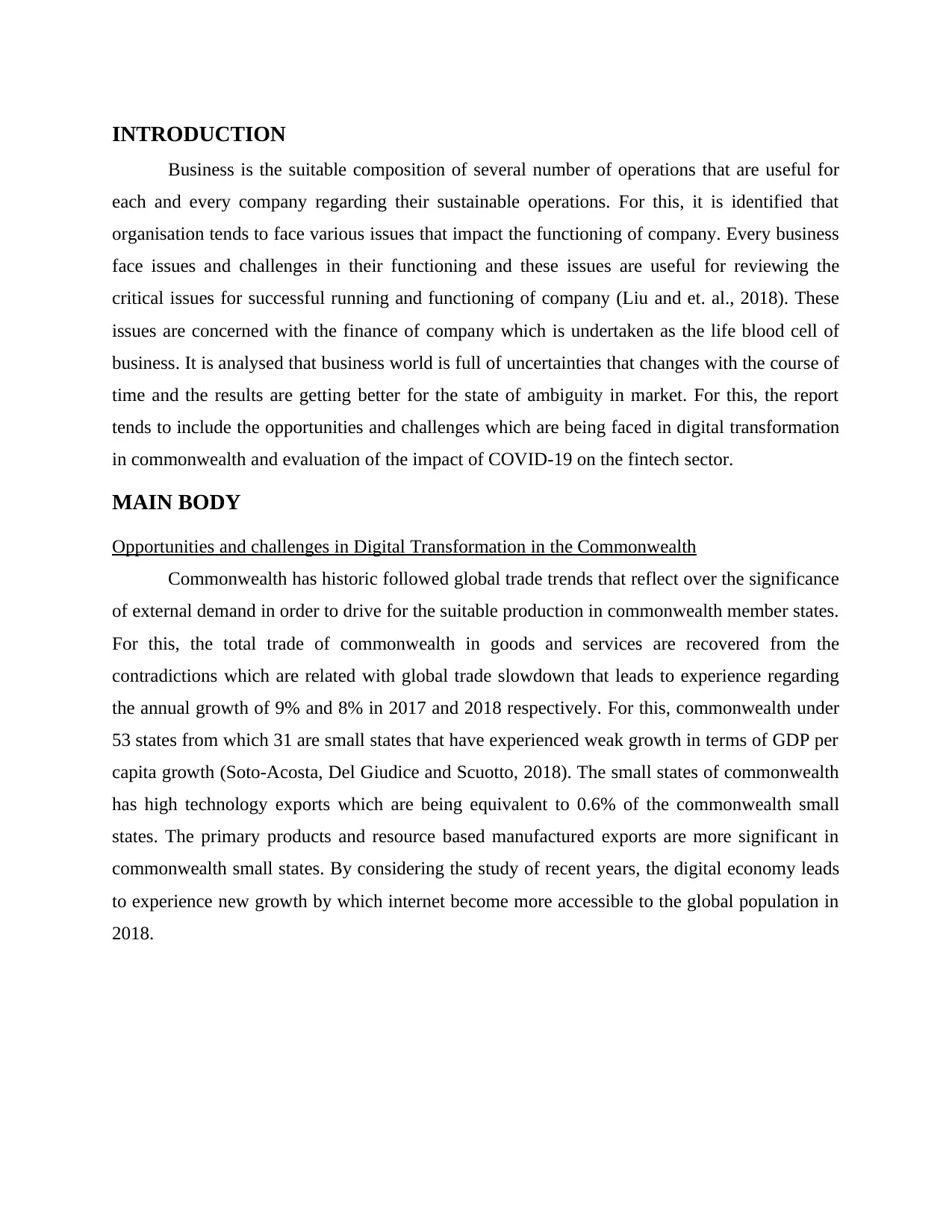
INTRODUCTION
Business is the suitable composition of several number of operations that are useful for
each and every company regarding their sustainable operations. For this, it is identified that
organisation tends to face various issues that impact the functioning of company. Every business
face issues and challenges in their functioning and these issues are useful for reviewing the
critical issues for successful running and functioning of company (Liu and et. al., 2018). These
issues are concerned with the finance of company which is undertaken as the life blood cell of
business. It is analysed that business world is full of uncertainties that changes with the course of
time and the results are getting better for the state of ambiguity in market. For this, the report
tends to include the opportunities and challenges which are being faced in digital transformation
in commonwealth and evaluation of the impact of COVID-19 on the fintech sector.
MAIN BODY
Opportunities and challenges in Digital Transformation in the Commonwealth
Commonwealth has historic followed global trade trends that reflect over the significance
of external demand in order to drive for the suitable production in commonwealth member states.
For this, the total trade of commonwealth in goods and services are recovered from the
contradictions which are related with global trade slowdown that leads to experience regarding
the annual growth of 9% and 8% in 2017 and 2018 respectively. For this, commonwealth under
53 states from which 31 are small states that have experienced weak growth in terms of GDP per
capita growth (Soto-Acosta, Del Giudice and Scuotto, 2018). The small states of commonwealth
has high technology exports which are being equivalent to 0.6% of the commonwealth small
states. The primary products and resource based manufactured exports are more significant in
commonwealth small states. By considering the study of recent years, the digital economy leads
to experience new growth by which internet become more accessible to the global population in
2018.
Business is the suitable composition of several number of operations that are useful for
each and every company regarding their sustainable operations. For this, it is identified that
organisation tends to face various issues that impact the functioning of company. Every business
face issues and challenges in their functioning and these issues are useful for reviewing the
critical issues for successful running and functioning of company (Liu and et. al., 2018). These
issues are concerned with the finance of company which is undertaken as the life blood cell of
business. It is analysed that business world is full of uncertainties that changes with the course of
time and the results are getting better for the state of ambiguity in market. For this, the report
tends to include the opportunities and challenges which are being faced in digital transformation
in commonwealth and evaluation of the impact of COVID-19 on the fintech sector.
MAIN BODY
Opportunities and challenges in Digital Transformation in the Commonwealth
Commonwealth has historic followed global trade trends that reflect over the significance
of external demand in order to drive for the suitable production in commonwealth member states.
For this, the total trade of commonwealth in goods and services are recovered from the
contradictions which are related with global trade slowdown that leads to experience regarding
the annual growth of 9% and 8% in 2017 and 2018 respectively. For this, commonwealth under
53 states from which 31 are small states that have experienced weak growth in terms of GDP per
capita growth (Soto-Acosta, Del Giudice and Scuotto, 2018). The small states of commonwealth
has high technology exports which are being equivalent to 0.6% of the commonwealth small
states. The primary products and resource based manufactured exports are more significant in
commonwealth small states. By considering the study of recent years, the digital economy leads
to experience new growth by which internet become more accessible to the global population in
2018.
⊘ This is a preview!⊘
Do you want full access?
Subscribe today to unlock all pages.

Trusted by 1+ million students worldwide
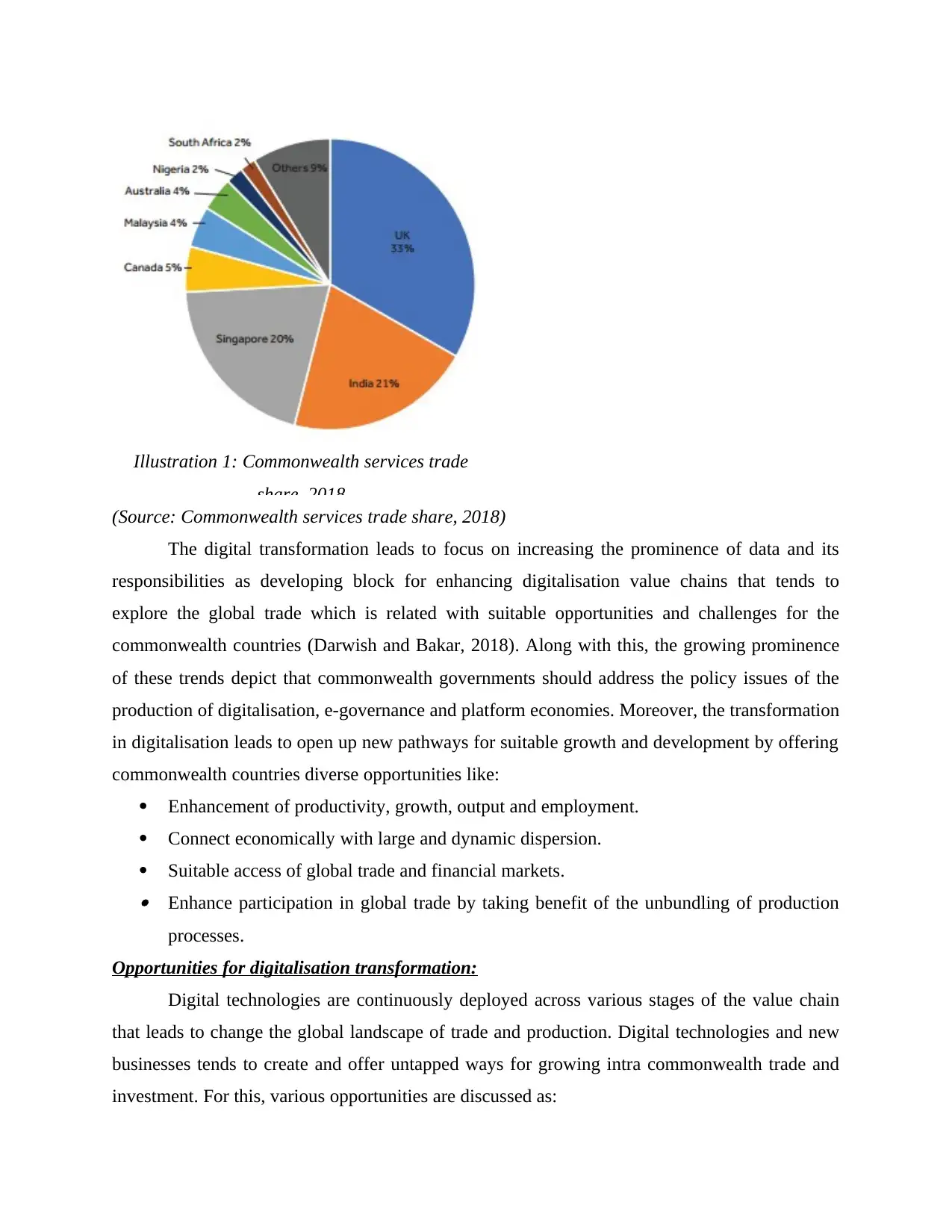
Illustration 1: Commonwealth services trade
share, 2018
(Source: Commonwealth services trade share, 2018)
The digital transformation leads to focus on increasing the prominence of data and its
responsibilities as developing block for enhancing digitalisation value chains that tends to
explore the global trade which is related with suitable opportunities and challenges for the
commonwealth countries (Darwish and Bakar, 2018). Along with this, the growing prominence
of these trends depict that commonwealth governments should address the policy issues of the
production of digitalisation, e-governance and platform economies. Moreover, the transformation
in digitalisation leads to open up new pathways for suitable growth and development by offering
commonwealth countries diverse opportunities like:
Enhancement of productivity, growth, output and employment.
Connect economically with large and dynamic dispersion.
Suitable access of global trade and financial markets. Enhance participation in global trade by taking benefit of the unbundling of production
processes.
Opportunities for digitalisation transformation:
Digital technologies are continuously deployed across various stages of the value chain
that leads to change the global landscape of trade and production. Digital technologies and new
businesses tends to create and offer untapped ways for growing intra commonwealth trade and
investment. For this, various opportunities are discussed as:
share, 2018
(Source: Commonwealth services trade share, 2018)
The digital transformation leads to focus on increasing the prominence of data and its
responsibilities as developing block for enhancing digitalisation value chains that tends to
explore the global trade which is related with suitable opportunities and challenges for the
commonwealth countries (Darwish and Bakar, 2018). Along with this, the growing prominence
of these trends depict that commonwealth governments should address the policy issues of the
production of digitalisation, e-governance and platform economies. Moreover, the transformation
in digitalisation leads to open up new pathways for suitable growth and development by offering
commonwealth countries diverse opportunities like:
Enhancement of productivity, growth, output and employment.
Connect economically with large and dynamic dispersion.
Suitable access of global trade and financial markets. Enhance participation in global trade by taking benefit of the unbundling of production
processes.
Opportunities for digitalisation transformation:
Digital technologies are continuously deployed across various stages of the value chain
that leads to change the global landscape of trade and production. Digital technologies and new
businesses tends to create and offer untapped ways for growing intra commonwealth trade and
investment. For this, various opportunities are discussed as:
Paraphrase This Document
Need a fresh take? Get an instant paraphrase of this document with our AI Paraphraser
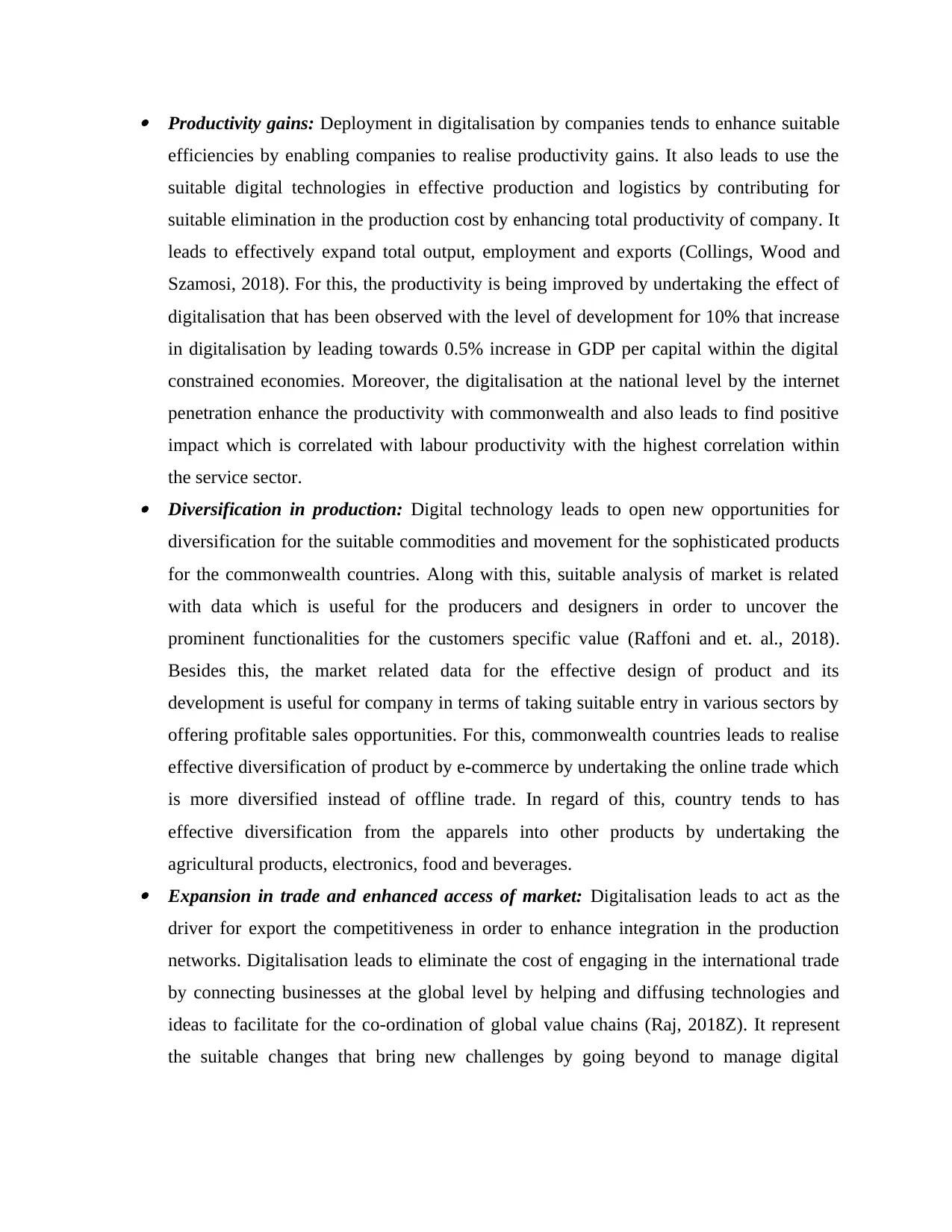
Productivity gains: Deployment in digitalisation by companies tends to enhance suitable
efficiencies by enabling companies to realise productivity gains. It also leads to use the
suitable digital technologies in effective production and logistics by contributing for
suitable elimination in the production cost by enhancing total productivity of company. It
leads to effectively expand total output, employment and exports (Collings, Wood and
Szamosi, 2018). For this, the productivity is being improved by undertaking the effect of
digitalisation that has been observed with the level of development for 10% that increase
in digitalisation by leading towards 0.5% increase in GDP per capital within the digital
constrained economies. Moreover, the digitalisation at the national level by the internet
penetration enhance the productivity with commonwealth and also leads to find positive
impact which is correlated with labour productivity with the highest correlation within
the service sector. Diversification in production: Digital technology leads to open new opportunities for
diversification for the suitable commodities and movement for the sophisticated products
for the commonwealth countries. Along with this, suitable analysis of market is related
with data which is useful for the producers and designers in order to uncover the
prominent functionalities for the customers specific value (Raffoni and et. al., 2018).
Besides this, the market related data for the effective design of product and its
development is useful for company in terms of taking suitable entry in various sectors by
offering profitable sales opportunities. For this, commonwealth countries leads to realise
effective diversification of product by e-commerce by undertaking the online trade which
is more diversified instead of offline trade. In regard of this, country tends to has
effective diversification from the apparels into other products by undertaking the
agricultural products, electronics, food and beverages. Expansion in trade and enhanced access of market: Digitalisation leads to act as the
driver for export the competitiveness in order to enhance integration in the production
networks. Digitalisation leads to eliminate the cost of engaging in the international trade
by connecting businesses at the global level by helping and diffusing technologies and
ideas to facilitate for the co-ordination of global value chains (Raj, 2018Z). It represent
the suitable changes that bring new challenges by going beyond to manage digital
efficiencies by enabling companies to realise productivity gains. It also leads to use the
suitable digital technologies in effective production and logistics by contributing for
suitable elimination in the production cost by enhancing total productivity of company. It
leads to effectively expand total output, employment and exports (Collings, Wood and
Szamosi, 2018). For this, the productivity is being improved by undertaking the effect of
digitalisation that has been observed with the level of development for 10% that increase
in digitalisation by leading towards 0.5% increase in GDP per capital within the digital
constrained economies. Moreover, the digitalisation at the national level by the internet
penetration enhance the productivity with commonwealth and also leads to find positive
impact which is correlated with labour productivity with the highest correlation within
the service sector. Diversification in production: Digital technology leads to open new opportunities for
diversification for the suitable commodities and movement for the sophisticated products
for the commonwealth countries. Along with this, suitable analysis of market is related
with data which is useful for the producers and designers in order to uncover the
prominent functionalities for the customers specific value (Raffoni and et. al., 2018).
Besides this, the market related data for the effective design of product and its
development is useful for company in terms of taking suitable entry in various sectors by
offering profitable sales opportunities. For this, commonwealth countries leads to realise
effective diversification of product by e-commerce by undertaking the online trade which
is more diversified instead of offline trade. In regard of this, country tends to has
effective diversification from the apparels into other products by undertaking the
agricultural products, electronics, food and beverages. Expansion in trade and enhanced access of market: Digitalisation leads to act as the
driver for export the competitiveness in order to enhance integration in the production
networks. Digitalisation leads to eliminate the cost of engaging in the international trade
by connecting businesses at the global level by helping and diffusing technologies and
ideas to facilitate for the co-ordination of global value chains (Raj, 2018Z). It represent
the suitable changes that bring new challenges by going beyond to manage digital
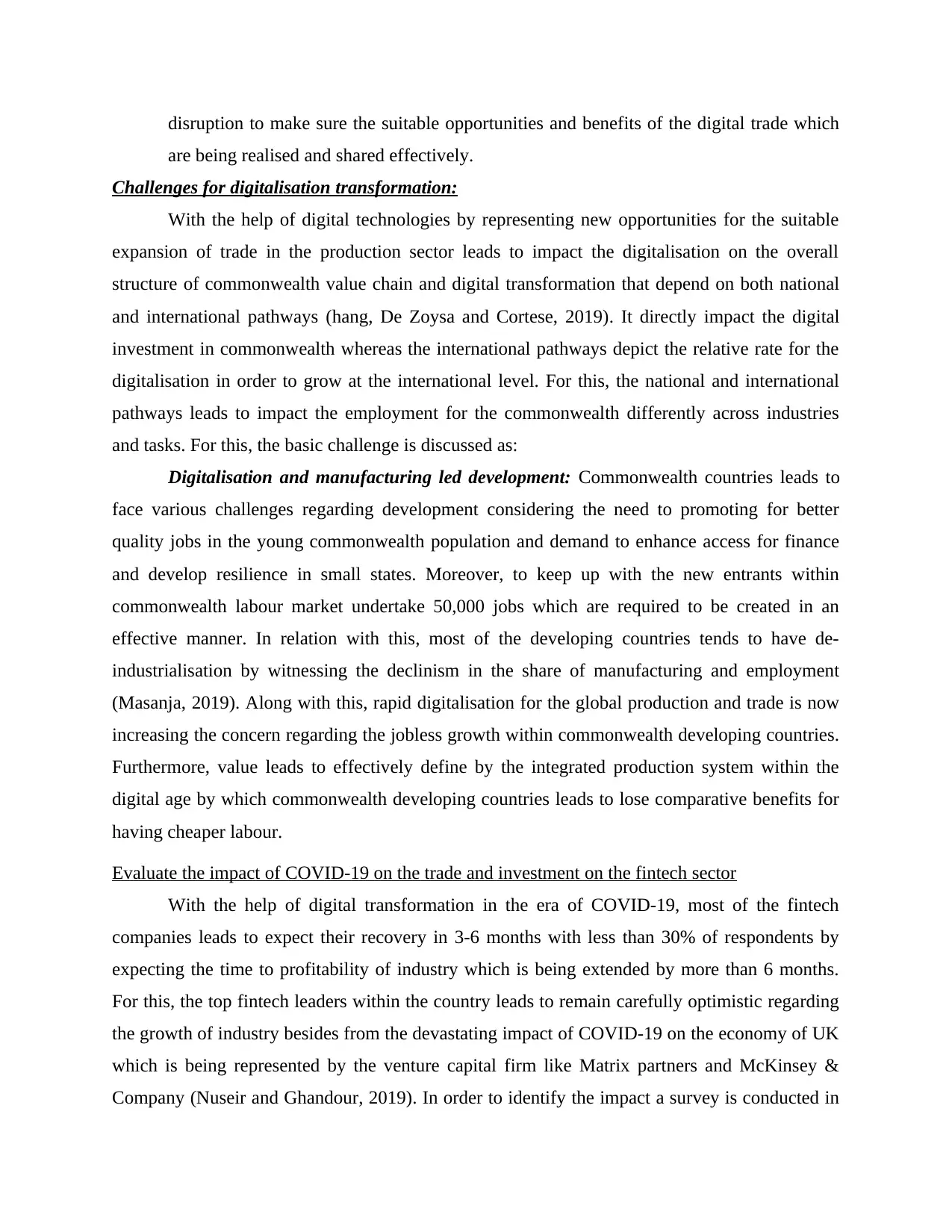
disruption to make sure the suitable opportunities and benefits of the digital trade which
are being realised and shared effectively.
Challenges for digitalisation transformation:
With the help of digital technologies by representing new opportunities for the suitable
expansion of trade in the production sector leads to impact the digitalisation on the overall
structure of commonwealth value chain and digital transformation that depend on both national
and international pathways (hang, De Zoysa and Cortese, 2019). It directly impact the digital
investment in commonwealth whereas the international pathways depict the relative rate for the
digitalisation in order to grow at the international level. For this, the national and international
pathways leads to impact the employment for the commonwealth differently across industries
and tasks. For this, the basic challenge is discussed as:
Digitalisation and manufacturing led development: Commonwealth countries leads to
face various challenges regarding development considering the need to promoting for better
quality jobs in the young commonwealth population and demand to enhance access for finance
and develop resilience in small states. Moreover, to keep up with the new entrants within
commonwealth labour market undertake 50,000 jobs which are required to be created in an
effective manner. In relation with this, most of the developing countries tends to have de-
industrialisation by witnessing the declinism in the share of manufacturing and employment
(Masanja, 2019). Along with this, rapid digitalisation for the global production and trade is now
increasing the concern regarding the jobless growth within commonwealth developing countries.
Furthermore, value leads to effectively define by the integrated production system within the
digital age by which commonwealth developing countries leads to lose comparative benefits for
having cheaper labour.
Evaluate the impact of COVID-19 on the trade and investment on the fintech sector
With the help of digital transformation in the era of COVID-19, most of the fintech
companies leads to expect their recovery in 3-6 months with less than 30% of respondents by
expecting the time to profitability of industry which is being extended by more than 6 months.
For this, the top fintech leaders within the country leads to remain carefully optimistic regarding
the growth of industry besides from the devastating impact of COVID-19 on the economy of UK
which is being represented by the venture capital firm like Matrix partners and McKinsey &
Company (Nuseir and Ghandour, 2019). In order to identify the impact a survey is conducted in
are being realised and shared effectively.
Challenges for digitalisation transformation:
With the help of digital technologies by representing new opportunities for the suitable
expansion of trade in the production sector leads to impact the digitalisation on the overall
structure of commonwealth value chain and digital transformation that depend on both national
and international pathways (hang, De Zoysa and Cortese, 2019). It directly impact the digital
investment in commonwealth whereas the international pathways depict the relative rate for the
digitalisation in order to grow at the international level. For this, the national and international
pathways leads to impact the employment for the commonwealth differently across industries
and tasks. For this, the basic challenge is discussed as:
Digitalisation and manufacturing led development: Commonwealth countries leads to
face various challenges regarding development considering the need to promoting for better
quality jobs in the young commonwealth population and demand to enhance access for finance
and develop resilience in small states. Moreover, to keep up with the new entrants within
commonwealth labour market undertake 50,000 jobs which are required to be created in an
effective manner. In relation with this, most of the developing countries tends to have de-
industrialisation by witnessing the declinism in the share of manufacturing and employment
(Masanja, 2019). Along with this, rapid digitalisation for the global production and trade is now
increasing the concern regarding the jobless growth within commonwealth developing countries.
Furthermore, value leads to effectively define by the integrated production system within the
digital age by which commonwealth developing countries leads to lose comparative benefits for
having cheaper labour.
Evaluate the impact of COVID-19 on the trade and investment on the fintech sector
With the help of digital transformation in the era of COVID-19, most of the fintech
companies leads to expect their recovery in 3-6 months with less than 30% of respondents by
expecting the time to profitability of industry which is being extended by more than 6 months.
For this, the top fintech leaders within the country leads to remain carefully optimistic regarding
the growth of industry besides from the devastating impact of COVID-19 on the economy of UK
which is being represented by the venture capital firm like Matrix partners and McKinsey &
Company (Nuseir and Ghandour, 2019). In order to identify the impact a survey is conducted in
⊘ This is a preview!⊘
Do you want full access?
Subscribe today to unlock all pages.

Trusted by 1+ million students worldwide
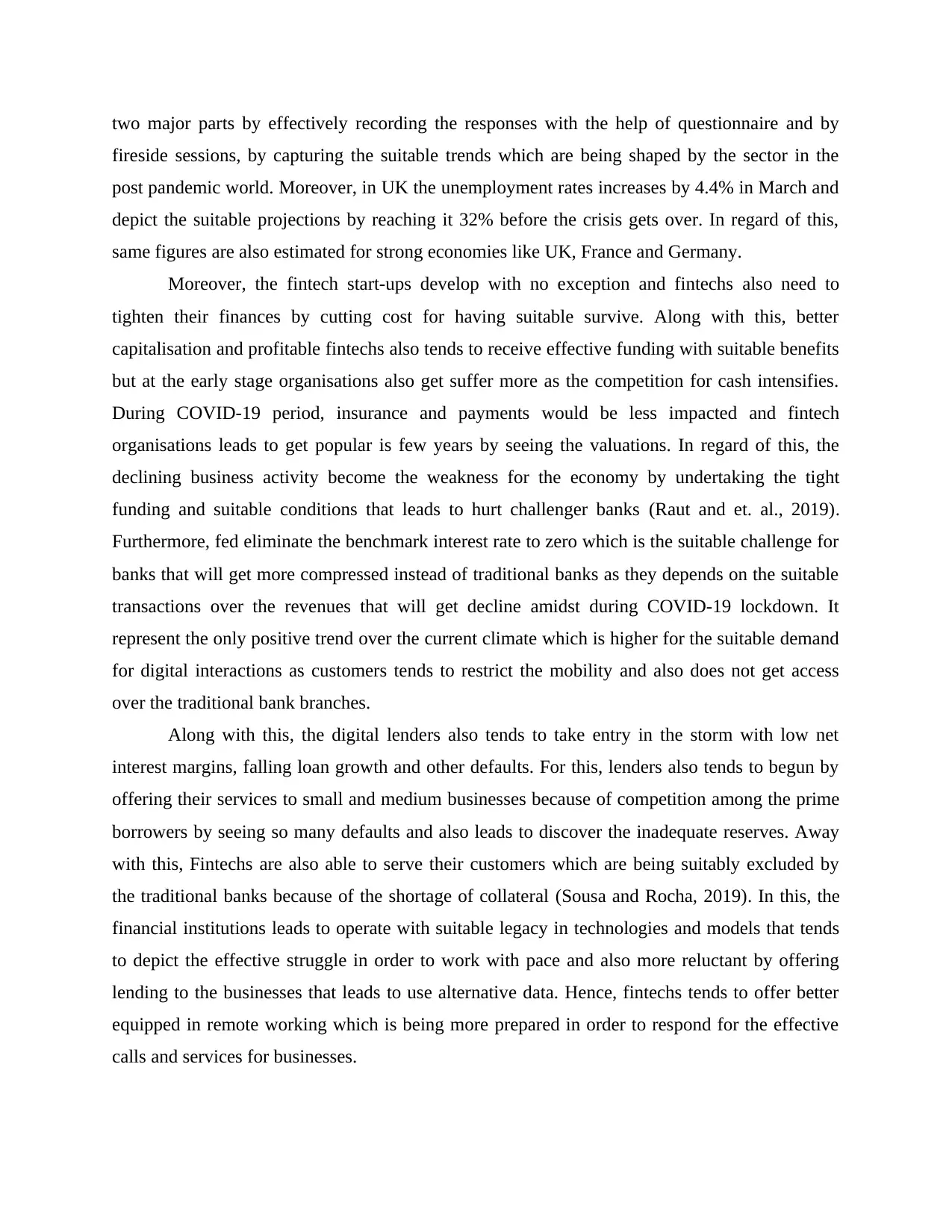
two major parts by effectively recording the responses with the help of questionnaire and by
fireside sessions, by capturing the suitable trends which are being shaped by the sector in the
post pandemic world. Moreover, in UK the unemployment rates increases by 4.4% in March and
depict the suitable projections by reaching it 32% before the crisis gets over. In regard of this,
same figures are also estimated for strong economies like UK, France and Germany.
Moreover, the fintech start-ups develop with no exception and fintechs also need to
tighten their finances by cutting cost for having suitable survive. Along with this, better
capitalisation and profitable fintechs also tends to receive effective funding with suitable benefits
but at the early stage organisations also get suffer more as the competition for cash intensifies.
During COVID-19 period, insurance and payments would be less impacted and fintech
organisations leads to get popular is few years by seeing the valuations. In regard of this, the
declining business activity become the weakness for the economy by undertaking the tight
funding and suitable conditions that leads to hurt challenger banks (Raut and et. al., 2019).
Furthermore, fed eliminate the benchmark interest rate to zero which is the suitable challenge for
banks that will get more compressed instead of traditional banks as they depends on the suitable
transactions over the revenues that will get decline amidst during COVID-19 lockdown. It
represent the only positive trend over the current climate which is higher for the suitable demand
for digital interactions as customers tends to restrict the mobility and also does not get access
over the traditional bank branches.
Along with this, the digital lenders also tends to take entry in the storm with low net
interest margins, falling loan growth and other defaults. For this, lenders also tends to begun by
offering their services to small and medium businesses because of competition among the prime
borrowers by seeing so many defaults and also leads to discover the inadequate reserves. Away
with this, Fintechs are also able to serve their customers which are being suitably excluded by
the traditional banks because of the shortage of collateral (Sousa and Rocha, 2019). In this, the
financial institutions leads to operate with suitable legacy in technologies and models that tends
to depict the effective struggle in order to work with pace and also more reluctant by offering
lending to the businesses that leads to use alternative data. Hence, fintechs tends to offer better
equipped in remote working which is being more prepared in order to respond for the effective
calls and services for businesses.
fireside sessions, by capturing the suitable trends which are being shaped by the sector in the
post pandemic world. Moreover, in UK the unemployment rates increases by 4.4% in March and
depict the suitable projections by reaching it 32% before the crisis gets over. In regard of this,
same figures are also estimated for strong economies like UK, France and Germany.
Moreover, the fintech start-ups develop with no exception and fintechs also need to
tighten their finances by cutting cost for having suitable survive. Along with this, better
capitalisation and profitable fintechs also tends to receive effective funding with suitable benefits
but at the early stage organisations also get suffer more as the competition for cash intensifies.
During COVID-19 period, insurance and payments would be less impacted and fintech
organisations leads to get popular is few years by seeing the valuations. In regard of this, the
declining business activity become the weakness for the economy by undertaking the tight
funding and suitable conditions that leads to hurt challenger banks (Raut and et. al., 2019).
Furthermore, fed eliminate the benchmark interest rate to zero which is the suitable challenge for
banks that will get more compressed instead of traditional banks as they depends on the suitable
transactions over the revenues that will get decline amidst during COVID-19 lockdown. It
represent the only positive trend over the current climate which is higher for the suitable demand
for digital interactions as customers tends to restrict the mobility and also does not get access
over the traditional bank branches.
Along with this, the digital lenders also tends to take entry in the storm with low net
interest margins, falling loan growth and other defaults. For this, lenders also tends to begun by
offering their services to small and medium businesses because of competition among the prime
borrowers by seeing so many defaults and also leads to discover the inadequate reserves. Away
with this, Fintechs are also able to serve their customers which are being suitably excluded by
the traditional banks because of the shortage of collateral (Sousa and Rocha, 2019). In this, the
financial institutions leads to operate with suitable legacy in technologies and models that tends
to depict the effective struggle in order to work with pace and also more reluctant by offering
lending to the businesses that leads to use alternative data. Hence, fintechs tends to offer better
equipped in remote working which is being more prepared in order to respond for the effective
calls and services for businesses.
Paraphrase This Document
Need a fresh take? Get an instant paraphrase of this document with our AI Paraphraser

CONCLUSION
Therefore, it is analysed that the report focus on the concept of globalisation by which
they leads to analyse that how business leads to get promoted and also expand by using suitable
measures. For this, suitable use of digitalisation is analysed by considering the prominent
transformation in business that leads to enable management in order to operate business in an
effective manner. In regard of this, suitable opportunities and challenges are also identified
regarding the transformation in digitalisation. Hence, these outcomes are useful in preparing
effective business segment which is useful in order to execute suitable operations in other areas.
Therefore, it is analysed that the report focus on the concept of globalisation by which
they leads to analyse that how business leads to get promoted and also expand by using suitable
measures. For this, suitable use of digitalisation is analysed by considering the prominent
transformation in business that leads to enable management in order to operate business in an
effective manner. In regard of this, suitable opportunities and challenges are also identified
regarding the transformation in digitalisation. Hence, these outcomes are useful in preparing
effective business segment which is useful in order to execute suitable operations in other areas.
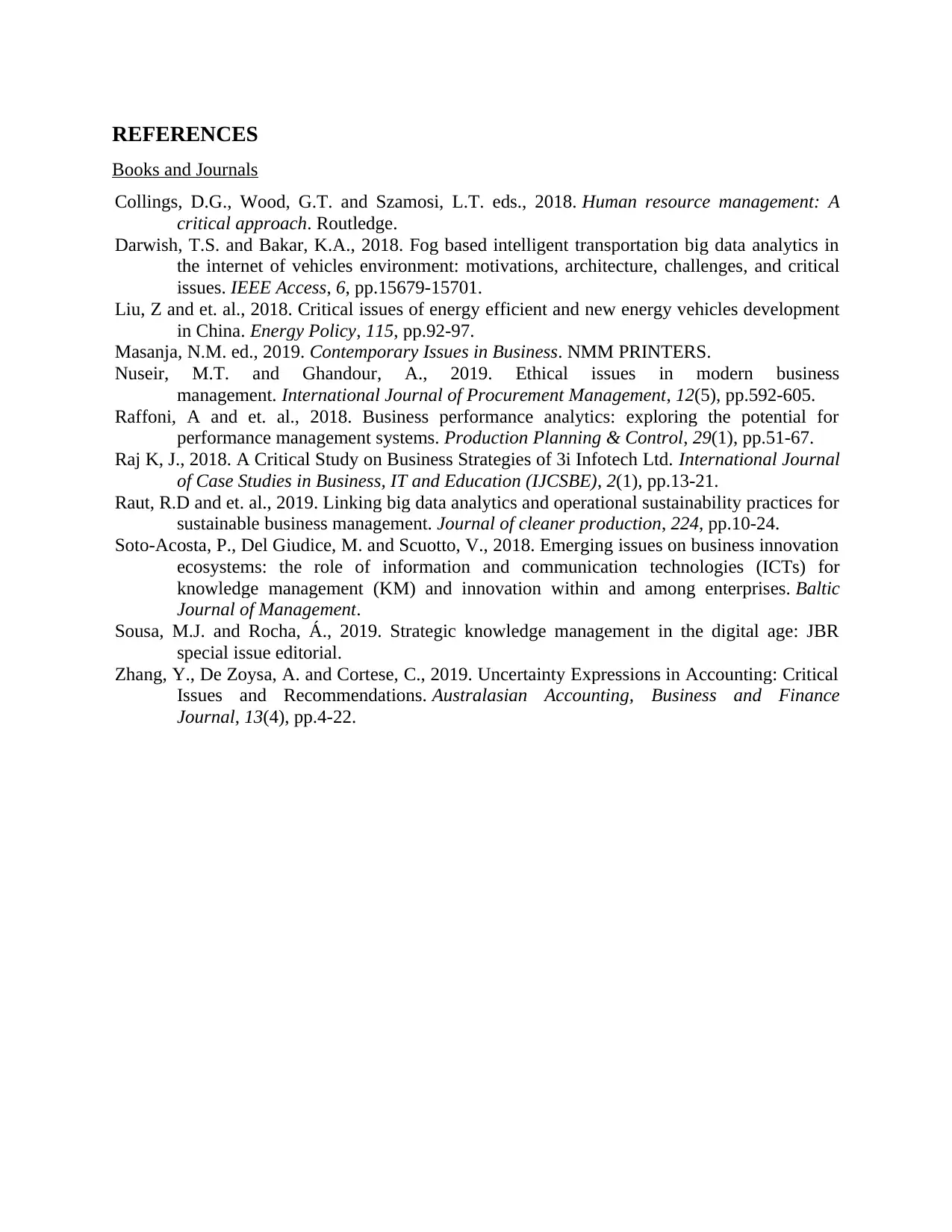
REFERENCES
Books and Journals
Collings, D.G., Wood, G.T. and Szamosi, L.T. eds., 2018. Human resource management: A
critical approach. Routledge.
Darwish, T.S. and Bakar, K.A., 2018. Fog based intelligent transportation big data analytics in
the internet of vehicles environment: motivations, architecture, challenges, and critical
issues. IEEE Access, 6, pp.15679-15701.
Liu, Z and et. al., 2018. Critical issues of energy efficient and new energy vehicles development
in China. Energy Policy, 115, pp.92-97.
Masanja, N.M. ed., 2019. Contemporary Issues in Business. NMM PRINTERS.
Nuseir, M.T. and Ghandour, A., 2019. Ethical issues in modern business
management. International Journal of Procurement Management, 12(5), pp.592-605.
Raffoni, A and et. al., 2018. Business performance analytics: exploring the potential for
performance management systems. Production Planning & Control, 29(1), pp.51-67.
Raj K, J., 2018. A Critical Study on Business Strategies of 3i Infotech Ltd. International Journal
of Case Studies in Business, IT and Education (IJCSBE), 2(1), pp.13-21.
Raut, R.D and et. al., 2019. Linking big data analytics and operational sustainability practices for
sustainable business management. Journal of cleaner production, 224, pp.10-24.
Soto-Acosta, P., Del Giudice, M. and Scuotto, V., 2018. Emerging issues on business innovation
ecosystems: the role of information and communication technologies (ICTs) for
knowledge management (KM) and innovation within and among enterprises. Baltic
Journal of Management.
Sousa, M.J. and Rocha, Á., 2019. Strategic knowledge management in the digital age: JBR
special issue editorial.
Zhang, Y., De Zoysa, A. and Cortese, C., 2019. Uncertainty Expressions in Accounting: Critical
Issues and Recommendations. Australasian Accounting, Business and Finance
Journal, 13(4), pp.4-22.
Books and Journals
Collings, D.G., Wood, G.T. and Szamosi, L.T. eds., 2018. Human resource management: A
critical approach. Routledge.
Darwish, T.S. and Bakar, K.A., 2018. Fog based intelligent transportation big data analytics in
the internet of vehicles environment: motivations, architecture, challenges, and critical
issues. IEEE Access, 6, pp.15679-15701.
Liu, Z and et. al., 2018. Critical issues of energy efficient and new energy vehicles development
in China. Energy Policy, 115, pp.92-97.
Masanja, N.M. ed., 2019. Contemporary Issues in Business. NMM PRINTERS.
Nuseir, M.T. and Ghandour, A., 2019. Ethical issues in modern business
management. International Journal of Procurement Management, 12(5), pp.592-605.
Raffoni, A and et. al., 2018. Business performance analytics: exploring the potential for
performance management systems. Production Planning & Control, 29(1), pp.51-67.
Raj K, J., 2018. A Critical Study on Business Strategies of 3i Infotech Ltd. International Journal
of Case Studies in Business, IT and Education (IJCSBE), 2(1), pp.13-21.
Raut, R.D and et. al., 2019. Linking big data analytics and operational sustainability practices for
sustainable business management. Journal of cleaner production, 224, pp.10-24.
Soto-Acosta, P., Del Giudice, M. and Scuotto, V., 2018. Emerging issues on business innovation
ecosystems: the role of information and communication technologies (ICTs) for
knowledge management (KM) and innovation within and among enterprises. Baltic
Journal of Management.
Sousa, M.J. and Rocha, Á., 2019. Strategic knowledge management in the digital age: JBR
special issue editorial.
Zhang, Y., De Zoysa, A. and Cortese, C., 2019. Uncertainty Expressions in Accounting: Critical
Issues and Recommendations. Australasian Accounting, Business and Finance
Journal, 13(4), pp.4-22.
⊘ This is a preview!⊘
Do you want full access?
Subscribe today to unlock all pages.

Trusted by 1+ million students worldwide
1 out of 9
Related Documents
Your All-in-One AI-Powered Toolkit for Academic Success.
+13062052269
info@desklib.com
Available 24*7 on WhatsApp / Email
![[object Object]](/_next/static/media/star-bottom.7253800d.svg)
Unlock your academic potential
Copyright © 2020–2026 A2Z Services. All Rights Reserved. Developed and managed by ZUCOL.



